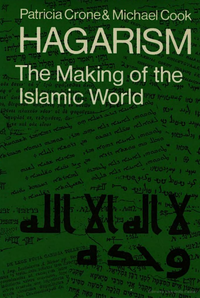 Cover of the first edition | |
| Authors | Patricia Crone Michael Cook |
|---|---|
| Language | English |
| Subject | History of Islam |
| Published | 1977 |
| Publication place | United States |
| Media type | Print (Hardcover and Paperback) |
| Pages | 277 |
| ISBN | 978-0521297547 |
Hagarism: The Making of the Islamic World is a 1977 book about the early history of Islam by the historians Patricia Crone and Michael Cook.[1] Drawing on archaeological evidence and contemporary documents in Arabic, Armenian, Coptic, Greek, Hebrew, Aramaic, Latin and Syriac, Crone and Cook depict an early Islam very different from the traditionally-accepted version derived from Muslim historical accounts.[2]
According to the authors, "Hagarenes" was a term which near-contemporary sources used to name an Arab movement of the 7th century CE whose conquests and resultant caliphate were inspired by Jewish messianism. Crone and Cook contend that an alliance of Arabs and Jews sought to reclaim the Promised Land from the Byzantine Empire, that the Qur'an consists of 8th-century edits of various Judeo-Christian and other Middle-Eastern sources, and that Muhammad was the herald of Umar "the redeemer", a Judaic messiah.[3]
The hypotheses proposed in Hagarism have been widely criticized,[2][3][4] and by 2002, the authors themselves had admitted that a lot of their hypotheses were wrong.[5][6][7] Nevertheless, the book has been hailed as a seminal work in its branch of Islamic historiography.[2][3][8][9] The book questioned prevailing assumptions about traditional sources, proposing new interpretations that opened avenues for research and discussion. It connected the history of early Islam to other areas, from Mediterranean late antiquity to theories of acculturation. Following earlier critical work by Goldziher, Schacht, and Wansbrough, it challenged scholars to use a much wider methodology, including techniques already used in biblical studies.[5] It is thus credited for provoking a major development of the field, even though it might be viewed more as a "what-if" experiment than as a research monograph.[3][10]
- ^ Crone, Patricia; Cook, Michael (1977). Hagarism; The Making Of The Islamic World. London: Cambridge University Press. ISBN 0-521-21133-6.
- ^ a b c Cite error: The named reference
Waineswas invoked but never defined (see the help page). - ^ a b c d Cite error: The named reference
Humphreyswas invoked but never defined (see the help page). - ^ Gordon Newby (1988). A History of the Jews of Arabia. Los Angeles, California: University of California Press. p. 110.
The reconstructable past as presented in Hagarism relies only on sources outside of Islâm, and constructs a view of a past so as odds with conventional views that it has been almost universally rejected. This has been particularly so because the authors' criticisms of the possibilities of understanding the earliest periods of Islâm would seem, if applied as a general method to the sources used by historians of religion, to lead toward a kind of historical solipsism.
- ^ a b Cite error: The named reference
Tannouswas invoked but never defined (see the help page). - ^ Stille, Alexander (2 March 2002). "Scholars Are Quietly Offering New Theories of the Koran". The New York Times. Retrieved August 22, 2012.
Mr. Cook and Ms. Crone have revised some of their early hypotheses while sticking to others. We were certainly wrong about quite a lot of things, Ms. Crone said. But I stick to the basic point we made: that Islamic history did not arise as the classic tradition says it does.
- ^ Khan, Liaquat Ali. "Hagarism: The Story of a Book Written by Infidels for Infidels". Baltimore Chronicle. Retrieved 2020-11-08.
- ^ Shoemaker, Stephen J. (2011-11-29). The Death of a Prophet: The End of Muhammad's Life and the Beginnings of Islam. University of Pennsylvania. pp. 1–2. doi:10.9783/9780812205138. ISBN 978-0-8122-0513-8.
There are, it must be admitted, some considerable and undeniable flaws in Hagarism's reinterpretation of formative Islam, as even its most sympathetic readers have often acknowledged. Most significantly, Hagarism has been rightly criticized for its occasionally uncritical use of non-Islamic sources in reconstructing the origins of Islam. [...] The imperfections of Hagarism should not lead us to discount completely the important insights that both this study and its approach have to offer. While some scholars have somewhat unfairly dismissed Hagarism and its approach as either hopelessly colonialist or methodologically flawed, there is still much to gain from this seminal book.
- ^ Cite error: The named reference
MERwas invoked but never defined (see the help page). - ^ Cite error: The named reference
van Esswas invoked but never defined (see the help page).